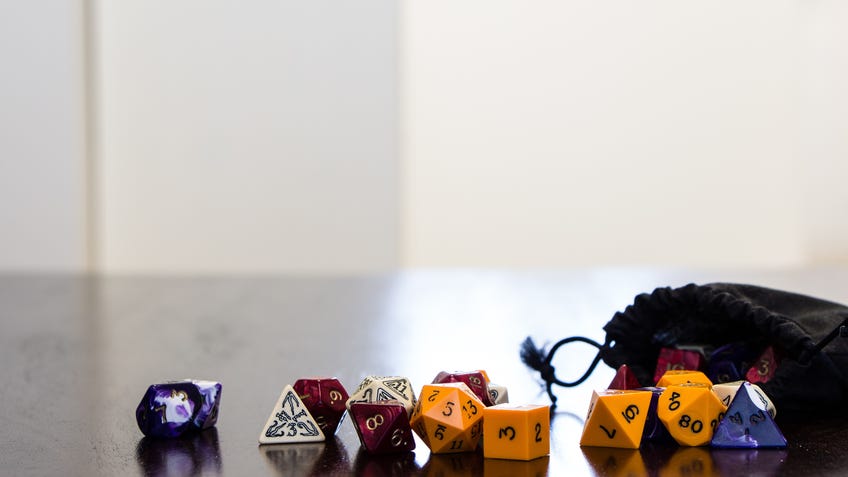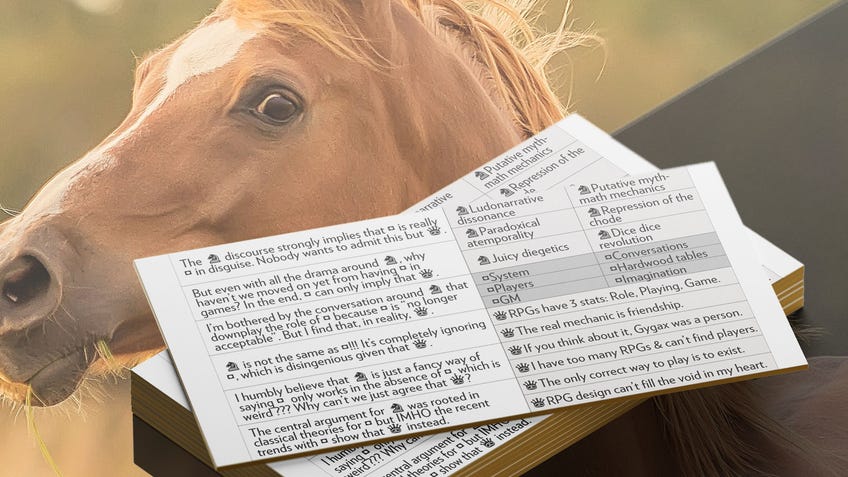Experimental lyric RPGs are pushing the poetic power of roleplaying forward
By destroying the boundary between players and characters, lyric games innovate new ways to play - or, sometimes, not play at all.
In the massive ecosystem of tabletop roleplaying games, lyric games occupy a special and unique place. You might not have heard of lyric games, and that’s great. It means you get to discover a new, weird, wild, wonderful and challenging new genre of TTRPGs. These games - often small, sometimes overlooked - are helping redefine what’s possible in roleplaying.
So, what is a lyric game? While the genre often defies definition, typically lyric games embody one or more of the following aspects: a removal of the distance between the ‘player’ and the ‘character’, the gamification of everyday experiences, and the reversal of assumptions to impact play. “Lyric games” as a term was coined by John R. Harness in late 2019 but, as it was a definition meant to encompass an emergent genre, many games published before 2019 are now considered lyric. Many lyric games are sold and distributed with anti-capitalist and community-forward priorities - often there will be community copies (copies donated by the author for those experiencing marginalisation or hardship) or games will be on ‘sale’ forever, allowing a pay-what-you-want model via itch. But these are just guidelines. Lyric games are a lot like porn: hard to explain, but you know it when you see it.
A lot of lyric games are solo journaling games, and many more are solo games that do not include dice rolls, stats or settings. Most outline a scenario and explain how to interact with it, allowing a lot of room for interpretation within the game. Lyric games are, at their core, about challenging what games are by offering new ways to interact with guided playfulness. It’s all a little esoteric, and that’s part of the appeal. These games are made for a community that wants to push the boundaries of gaming and immersion, creating a space where marginalised creators are at the forefront of the genre, helping build and promote work that breaks convention.
Because these games are, by and large, experimental, there’s no ‘right’ way to talk about, design or even critique a lyric game.
There are some “classic” lyric games out there, but more often when discussing lyric games it’s easier to talk about the designers who are working in the space. Some lyric games (and their designers) are We Are But Worms, a one-word RPG by Riverhouse Games; Making Love, a LARP about boundaries, by Adira Slattery; 101 Games for Survival by Jay Dragon and Maria Mison, which could also be considered a series of poems; and Equus Hero by momatoes, which helps people navigate games discourse on Twitter. You can also find a lot of lyric games on the Not A Game Jam submission page.

Because these games are, by and large, experimental, there’s no ‘right’ way to talk about, design or even critique a lyric game. A lot of lyric games defy critique, mostly because it’s such a subjective medium that even the authors agree - if you don’t like it, it’s not for you. It’s hard to be objective about lyric games because interacting with them is so personal. It’s impossible to play (or, I would argue, even read) a lyric game while maintaining a full narrative distance.
LOGAN is deeply introspective and effective, taking you through different situations in the life of a young trans man.
Lyric games are challenging. That’s their whole point. They challenge designers, they challenge players, they challenge the industry. And as this genre fully comes into its own, we’re seeing some incredible games being made and produced that seek to expand the definition of lyric games to be more encompassing, innovative and experimental.
A truly wonderful game that has recently come out is LOGAN, described as an “autobiographical TTRPG” by designer Logan Timmins. LOGAN exemplifies some of the best aspects of lyric RPGs while also pushing the genre into a more experimental, longer-form functionality. While ostensibly a journaling game, LOGAN is deeply introspective and effective, taking you through different situations in the life of a young trans man as he struggles with school, identity and visibility. Within the game are numerous endearing, empathetic moments that allow you to question your own life while playing through Timmins’.
What LOGAN does, masterfully, is embody a type of power fantasy beyond traditional character control.
LOGAN, is, in my opinion, the next step for lyric games. Lyric games often attempt to break down the barrier between the player and the character, but LOGAN attempts to break down the barrier between player and designer. The genre has danced around this idea for a while and, in challenging the nature of games and play itself, many designers have said that simply reading a game is an act of play. LOGAN also does this, stating; “The first method of play is to read. To read and imagine is a form of play.”

But what LOGAN does, masterfully, is embody a type of power fantasy beyond traditional character control. In the game, we roll dice for all the different parts of our lives and in each option we still get control. We get to choose what happens to us. Because we are playing out scenes from Timmins’ life we also create realities where we get control over our own lives, and can see our own choices reflected in the game. LOGAN is an incredible bonding experience, a parasocial relationship developed through game design and journaling. We become Timmins in part while working through his game and in part while reflecting on our own actions, our own agency within this lyric game.
Lyric games are experimental and weird, but they’re not going away anytime soon.
It’s a challenging game. While not difficult to play, it is emotional. Within Timmins’ writing and evocative scenarios is an earnest kind of over-exposure that feels raw, authentic and real. Lyric games will move towards this; an ardent kind of game that seeks to do away with metaphors and explore the self through sincerity. Lyric games are still developing within their own, sometimes insular communities. A game like LOGAN, which has some markers of a traditional game and a ‘replayability’ that is sometimes hard to achieve through lyric games (which are often produced and distributed for their novelty), can serve to introduce people to this subcategory of tabletop RPGs.
Lyric games are experimental and weird, but they’re not going away anytime soon. There’s still so much that designers can achieve through lyric games, and writers are constantly innovating, pushing the boundaries of what games, play and community means in the RPG space.


